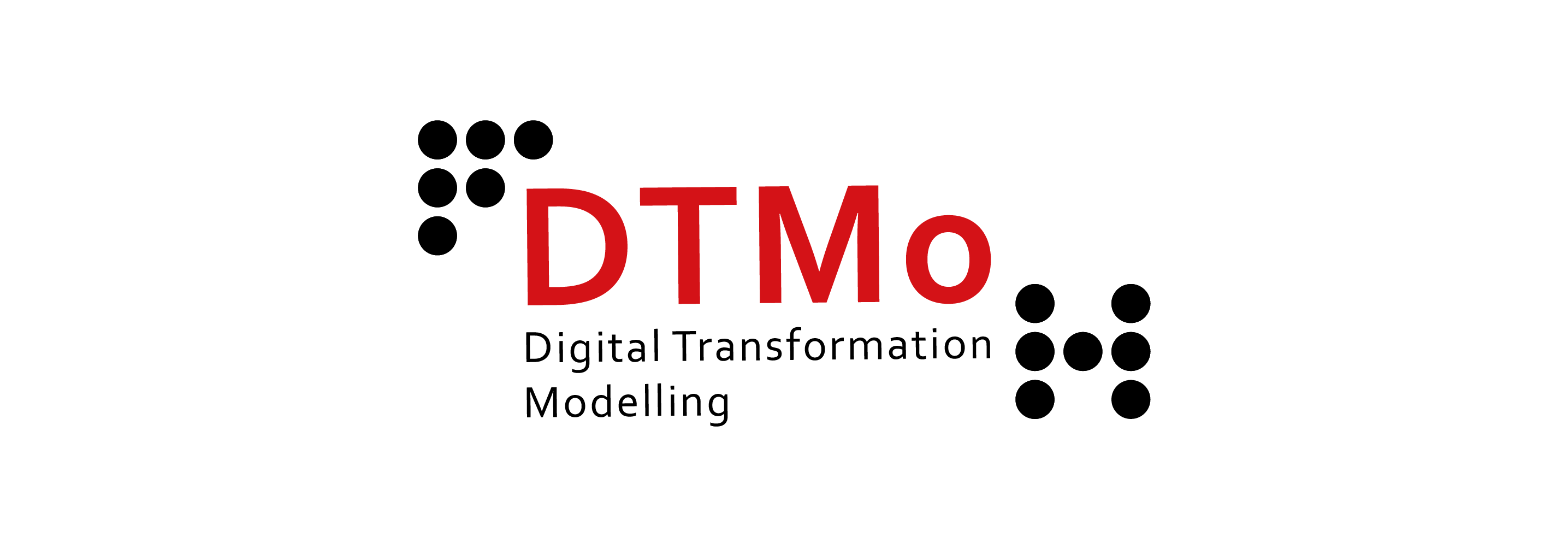About us
For many companies, digital transformation represents a major challenge, which can be related to changes in the business model, customer expectations, processes and much more. At the same time, the technological basis, the IT used, is also subject to change. Cloud computing, artificial intelligence and new concepts such as the block chain are changing both software development and IT operations and the way companies operate.
The significant increase in digitization can no longer be represented by existing models in companies (process diagrams, organization charts, data models, …). The research group Digital Transformation Modelling has therefore set itself the goal of evaluating, adapting and integrating existing models and developing new models. Additionally, methodologies for the application of the models are evaluated and developed. This should provide companies with tools to optimize the complexity of digitization and the use of IT within the companies.
The transformation brought about by digitisation
Progressive digitization is changing the framework conditions and IT in companies. The following areas are particularly noteworthy:
Digital aspects play an important role in the business model of many companies. From a support factor, information technology is changing to an essential part of the business model. Only the supporting IT makes the changed business model possible.
Cloud computing and technologies such as block chaining move data and applications outside the direct sphere of influence. Through the block chain or similar, decentralized registers can be set up and used. For example, a distributed general ledger in banking can reduce complexity and optimize the process.
Artificial intelligence comprises the digitalization of cognitive performance. AI is expected to bring about massive changes in the processing of large amounts of data, in corporate processes and in central corporate functions.
Activities
Kick-off event Digital Year 2018
This year the Digital Lab was also represented at the kick-off event Digital Year 2018 of the federal state of Carinthia on 30 May 2018 with an information stand and two workshops
Our target markets
The target market is Austrian SMEs affected by the digital transformation. We do not focus on any particular industry. The affected SMEs can benefit from this research topic in several ways:
Business model/
business processes
By modelling the business model and business processes with integration of digitisation, the implementation of projects can be significantly accelerated and the mapping into IT simplified.
Technological
Progress
Digitization topics are considered by the research project not only in terms of the business model or business processes, but also by the introduction of technological innovations (such as block chain, artificial intelligence).
Public
awareness
Through dissemination (conferences and meetings) and third mission (knowledge transfer, technology/innovation transfer and cooperation) the research topic is also made better known to a wider public.
The following results are foreseen

- (Further) development of models, methodologies, reference models and new concepts
- Use in companies as support for digital transformation
Contribution to scientific development through publications and presentations at conferences - Use in teaching in existing courses and in courses of the Master’s program Digital Transformation Management to be developed
Publications
Eixelsberger, W./ Disho, S. (2019): Enterprise Modelling und Internet of Things (IoT). In: Schweighofer, E./ Kummer, F./ Saarenpää, A. (Hrsg.): IRIS 2019 – Tagungsband des 22. Internationalen Rechtsinformatik Symposions. Wien: OCG, S.35-42
Eixelsberger, W./ Disho, S. (2018): Digital Transformation and Leadership – Modeling to reduce complexity. In: Böhm, S./Suntrayuth, S. (Hrsg.): Proceedings of Second International Workshop on Entrepreneurship in Electronic and Mobile Business – IWEMB 2018. Norderstedt, S. 69-80.
Team
The research group consists of staff from the Department of Economics and Management.

FH-Prof. Dr. Wolfgang Eixelsberger
Head of study program Digital Business Management

FH-Prof. Dipl.-Betrw. (FH) Stefan Nungesser
Head of study program Hotelmanagement

Dipl.-Ing. Martin Stromberger
University teaching for business informatics

DI (FH) Alfred Wieser
Research assistant



